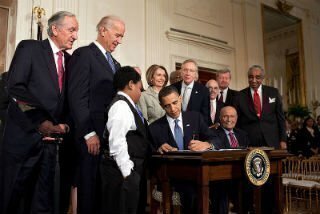Will the Supreme Court kill Obamacare after apparently saving it three years ago? That might be a drastic way at looking at Wednesday’s arguments about tax subsidies, but there’s no doubt the health insurance program would face an uncertain future if there were an adverse ruling.

The case of King v. Burwell is a significant challenge to the Affordable Care Act, or Obamacare. The Justices hear arguments on March 4, 2015 and they will try to decide if language in the act blocks people from getting tax breaks on premiums sold by federally run health-care exchanges in 34 states.
The tax credits go to people who most likely can’t afford to buy insurance at full prices on the exchanges. So a ruling that holds the subsidies are unconstitutional could have a big effect on Obamacare’s future.
Last week, Health and Human Services Secretary Sylvia M. Burwell said the Obama administration had no way to fix “massive damage” that would result from losing the subsidies as an incentive. (Burwell also was confident the Court would rule in the administration’s favor.)
The question before the Justices seems simple. Section 36B of the Affordable Care Act says that federal tax-credit subsidies for health insurance can only be offered on an “Exchange established by the State under section 1311” of the act.
The Obama administration used an Internal Revenue Service rule to make it clear the tax subsidies should be offered on all exchanges set up by the federal government in states that declined to set up their own Obamacare exchanges.
David King and three others challenged the IRS rule. King, from Virginia, claimed he was injured after the Obamacare subsidies made it impossible for him to get an exemption from the ACA’s individual mandate tax for not buying health insurance.
In November 2014, the Supreme Court accepted King v. Burwell after a divided three-judge panel on the District of Columbia Circuit Appeals Court struck down the tax subsidies in July 2014.
“Because we conclude that the ACA unambiguously restricts the section 36B subsidy to insurance purchased on Exchanges ‘established by the State,’ we reverse the district court and vacate the IRS’s regulation,” said Judge Thomas B. Griffith, writing for the 2-1 majority in what was then called Halbig v. Burwell.
In his dissent, Judge Harry Edwards spared no words.
“This case is about Appellants’ not-so-veiled attempt to gut the Patient Protection and Affordable Care Act,” he wrote. “Because the proposed judgment of the majority defies the will of Congress and the permissible interpretations of the agencies to whom Congress has delegated the authority to interpret and enforce the terms of the ACA, I dissent.”
After the Supreme Court accepted the appeal, the Obama administration made it clear in a brief to the Court that it believes the IRS can extend the tax subsidies nationwide.
“In accordance with the Act, the Treasury Department has made tax credits available to eligible individuals in every State—just as the Act’s other interlocking reforms apply nationwide,” the Justice Department argued in its official response to the Court.
“The Act’s text, structure, design, and history refute petitioners’ argument. As Treasury correctly concluded, federal premium tax credits are available through the Exchanges in every State.”
King’s attorneys insist that the law’s plain-text language is clear. “It is undisputed that § 36B’s plain text is not objectively absurd. Yet the Government contends that this text should be disregarded because it produces bad policy effects, and so Congress must not have subjectively meant it,” they argue in their court brief.
The Obama administration says more than 5 million people bought insurance in the 34 states with federally run exchanges, and the majority of those people use the tax subsidies.
The Supreme Court will likely issue a ruling in June or possibly early July, in the case.






